Doctor Europe and Mister Turkey
Adelina Marini, March 31, 2016
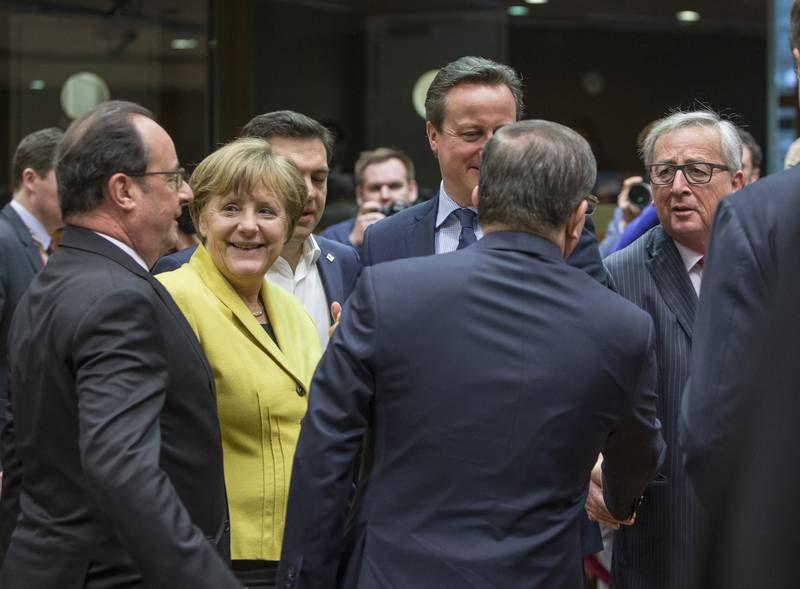
On March 18th, at yet another EU summit, the leaders of member states and Turkey shook hands on a deal, which will not save Europe from the refugees and will not mend the disintegration cracks, neither will it guarantee the restart of the eurointegration process in Turkey. At first glance, it looks as if the deal gives the EU a breath of air to acknowledge the situation it is in and plan the next, preferably common, steps. A closer look shows that, actually, this deal reveals a new and very serious problem for the EU and the enlargement policy - Turkey is out of control and pulling it back towards the Union and its value system will be extremely difficult having President Erdogan at the lead. The Turkish head of state is not the sole reason behind the difficulty in the European Union regaining its appeal. The other, much more serious reason is the Union itself with its two faces, as described by Turkish Prime Minister Ahmet Davutoğlu.
The Deal
There are several important pieces of news in the agreement, which solidified the draft negotiated before the 17-18 March summit in Brussels, which was reasonably regarded as proof that the EU had sold its soul to Turkey. The first piece of news is that the EU has not sold its soul ... yet. The second is that more than half a year later the EU accepted Ankara’s idea, defended at the European level by Bulgarian PM Boyko Borissov, about creating security zones within Syria itself, close to the border with Turkey. The third piece of news is that a Bulgarian amendment made it into the agreement, one which was pushed by Sofia with a peremptory tone. It is about having Turkey commit to taking the necessary measures to prevent illegal migration not just along the border with Greece, but with all neighbouring states, meaning Bulgaria as well.
The results of the two-day summit are the agreement with Turkey and one intra-European agreement. The parameters of the deal of March 7th are more or less intact. The operation for return of all new migrants, who come to the Greek islands from Turkey, began on March 20th. They will be returned using accelerated procedures for which the EU found legal grounds several days before the European Council. To do this the EU agrees that Turkey is a safe country of origin– a subject that so far lacked agreement on and there is still resistance on in the European Parliament. This was extremely important, for international law allows for the return of refugees if they are coming from a safe state. The scheme remains valid that, in exchange for Turkey's accepting the returned emigrants, for every Syrian returned from the Greek islands another Syrian citizen will be resettled from Turkey to the EU.
According to the intra-European agreement, however, this will be on voluntary basis. Hungary, Slovakia, and Great Britain will not participate. The former two because they are opposed to the scheme for resettlement and relocation of refugees, agreed on in September and which is the reason for a referendum that will be held in Hungary. Great Britain, on the other hand, uses its “special” status, negotiated at the February summit, which will, however, become valid after the referendum for the country’s remaining in the EU is held, provided the answer is for remaining. The vote is planned for June 23rd. This is exactly when the regular June EU summit is planned for. After the Brussels attacks of last week Polish PM Beata Szydło announced that Poland too gives up on its quota commitments. All others said they would stick to their commitments, although several made it very clear they were in no hurry to fulfil them.
In the conclusions from the Council, it says unequivocally that the Turkish-European deal does not mean new commitments by member states, who agreed in September to relocate amongst themselves 160 000 refugees, who have arrived in Greece and Italy, which includes transferring refugees from third countries, subjected to high migratory pressure. Most heavily affected are Jordan, Lebanon, and Turkey, with the latter having the most refugees at the moment – 2.7 million, according to PM Ahmet Davutoğlu.
Despite urges from EP President Martin Schulz (Socialists and Democrats, Germany) not to make a direct link between the deal for the refugees and Turkey’s European integration process, the declaration from the summit combines the two. The commitments, made at the summit of November 29th of last year for Turkey making progress on the renewal of the customs union agreement so as it includes Cyprus, are confirmed. On this subject the declaration welcomes the ongoing work on the resolving of this 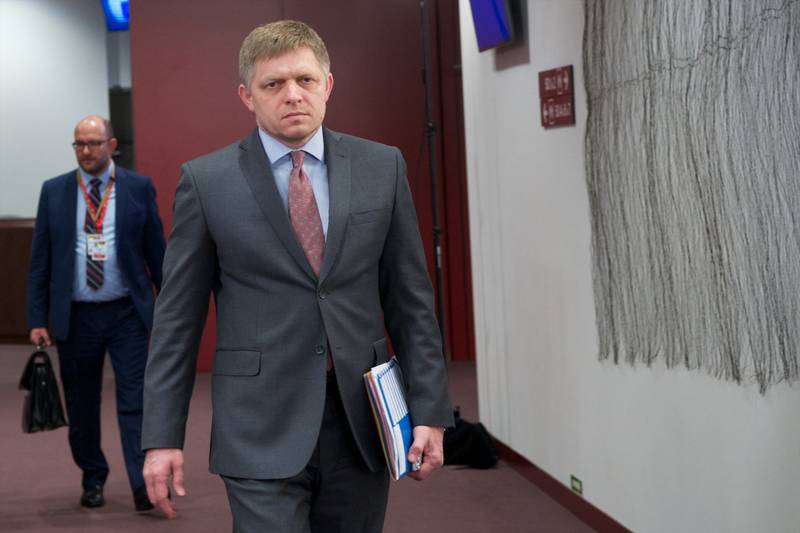 long-standing problem, which is the reason why Cyprus keeps blocked to Turkey the opening of several key negotiation chapters.
long-standing problem, which is the reason why Cyprus keeps blocked to Turkey the opening of several key negotiation chapters.
The commitment for opening new chapters is also met, but not as Turkey initially expected. Instead of opening key chapters, like 23 and 24, the EU-Turkey summit decided that only Chapter 33 "Financial and budgetary provisions” will be opened during the Dutch presidency. This chapter covers the financial resources for the common European budget, which is formed by member states’ instalments, but also by VAT revenues, customs and agricultural fees. Generally, a “harmless” chapter.
The reason is that, despite diplomatic efforts, Cyprus did not agree to lift its veto on the opening of the more sensitive and important chapters of the acquis, like 23 and 24, which cover human rights, minorities, media freedom, independence of the judiciary, rule of law, and the fight against corruption. At the same time, in “their own” conclusions leaders Чreiterate that they expect Turkey to respect the highest standards when it comes to democracy, rule of law, respect of fundamental freedoms, including freedom of expression.” This very item of the conclusions started a serious verbal shootout between EU institution leaders and Turkish PM Ahmet Davutoğlu, which we will discuss a bit later.
An important part of what was agreed with Turkey is the EU conceding to work with Turkey in order to “improve humanitarian conditions inside Syria, in particular in certain areas near the Turkish border which would allow for the local population and refugees to live in areas which will be more safe”. This is the very idea, which Turkey’s Prime Minister Ahmet Davutoğlu attempted to push through his Bulgarian colleague Boyko Borissov for the EU summit on September 23rd. Back then, Davutoğlu sent a letter to Mr Borissov, in which he urged the EU to commit to the formation of a “safety zone” in the northern part of Syria. According to Ankara, such a zone will allow for the voluntary return of refugees. “If we fail to create such security zones it will become inevitable for more than 7 million people in Syria to take the road to Europe, which would further deepen the current humanitarian crisis and will cause even more serious politically felt effects”, said the letter to the Bulgarian PM.
Boyko Borissov welcomed the idea and upheld it at the emergency summit in September, but it was categorically discarded. President Donald Tusk (Poland, EPP) said back then that the Turkish proposal for security zones “is not what we need”, for it would mean the creation of an 8-kilometre security zone, which includes military control with the participation of Europe and USA, a no-flight zone, presence on site. “It's a very ambitious project, but for us today the most important thing is to cooperate with our partners, not only Turkey, for a possible new way for the refugees”, were his words after the September 23rd summit. The commitment that by the end of the Dutch presidency visa liberalisation will begin for Turkey, provided it fulfils all 72 requirements, was also reconfirmed.
But why are you lynching ... media?
While all state leaders were praising the achieved agreement with Turkey as finally something, which could have real effect on the refugee flow towards Europe, sparks flew between Ankara and Brussels. Behind the smiles at the last press conference after the summit, there was hidden tension, which began showing more and more. European Commission President Jean-Claude Juncker (Luxembourg, EPP) began with the confession that the negotiations were tough, but fair. “Not everything that was said was to our liking but, nonetheless ,the talks were held in a friendly atmosphere”, he said, not clarifying exactly what was wrong. Right before the summit, Turkish President Recep Tayyip Erdoğan 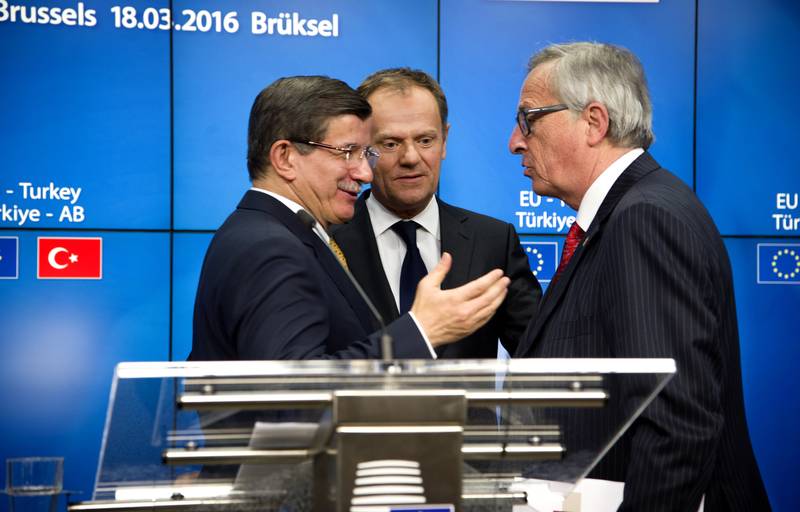 enraged European leaders by leaving behind the diplomatic tone and attacking them for allowing a Kurdish rally, right at the time of the summit.
enraged European leaders by leaving behind the diplomatic tone and attacking them for allowing a Kurdish rally, right at the time of the summit.
“The name for this is surrender, surrender to terrorism. There is no reason that bomb that exploded in Ankara won't be exploding in Brussels, where they gave the terrorist allies a chance to put on their show. The sheer thoughtlessness of the EU, it is like dancing in a minefield. There is an inevitable end to this. You are feeding a snake in your bosom. It could bite you at any moment. When the same bombs explode in your cities, you will understand. But then it will be too late”, said the Turkish president mere days before the terrorist attacks in Brussels of March 22. Answering the question how would he comment those expressions, Turkish PM Ahmet Davutoğlu poured more oil into the fire explaining that reality had different faces. One reality is the efforts of the leaders (of institutions) to reach an agreement with Turkey.
The other reality is what Mr Erdoğan is describing. It is the reality where some Europeans are trying to stop the refugees from coming to Europe. He refused to name a particular state “out of respect”, but the word is of countries, where leaders are saying Muslims have no place in Europe (Slovakia) and where journalists are kicking refugees (Hungary). He made it very clear that he supports his president in his opinion that Europe is dancing in a minefield. This means, he said, how we treat terrorism. Paris and Ankara are two capitals, which have suffered from terrorism. “And this is one face of the reality. The other face is a terrorist organisation who kills children, women, youngsters, 35 civilians in Ankara waiting in bus station - can you imagine in Brussels a car coming at a bus station and blowing up and those who are planning to go to their families died. This same organisation, with the same flags and symbols as demonstrating in the streets of Brussels. How would you feel?”, asked rhetorically Ahmet Davutoğlu and added that everyone should understand the Turks’ feelings.
“Erdoğan addressed one face of reality and I'm here to address the other. But they are the same Europe”, further said the Turkish PM, admitting officially to the distribution of roles in Turkey – Erdoğan plays bad cop, Davutoğlu plays good cop. Two faces again – doctor Davutoğlu and Mr Erdoğan. The reaction was swift. Donald Tusk, hardly restraining his anger, announced that Europe remained a main destination for refugees exactly “because of our standards, because we are the most open and the most tolerant continent and societies in the whole world”, he said. Juncker also could not hide his anger. “Can I just add 1,2,3 or 4 comments on this. I have a great deal of compassion for the victims of terrorism and particularly in Turkey in this case. But if I, as president of EC, were to address offensive comments to every country in the outlying areas of Europe [that] goes off the rails, I'd be doing this day and night. I'd never stop. I think that people should be careful about the sort of things they say and I think they should refrain from making excessive statements”, he said.
Ahmet Davutoğlu replied with an even harder blow: “Within the framework of freedom of expression we can express our thoughts as we please”, to which Donald Tusk replied that the freedom of speech was “our European benchmark”. Bulgarian PM Boyko Borissov categorically disagreed with the Turkish president’s opinion. “With all due respect to the Turkish president, there is no other continent, there are no other European countries to have shown such humanity, such solidarity, so much money, so much effort, incurring so many internal party problems if you will, as Europe with the refugees”, he said in front of journalists.
The problem, however, is that Turkey has found Europe’s weak spot, allowing it to pose as an equal to the EU and even more – to believe that the EU depends on it. Something that EP President Schulz warned about on several occasions. It is a fact, however, that not all member states show humanity to the refugees. Moreover, refugees brought the largest rift along the East-West axis in the EU since the big bang of unification on the continent – the last episode of reconciliation after the Second World War. Besides, there are states in the EU with an authoritarian inclination as well. At the moment, there is a procedure started against Poland for the protection of the rule of law. There were similar actions against Hungary as well, but to no avail. There is an ongoing campaign in both states for the harnessing of media. All of this encourages Turkey to demand more and more of the EU. The latest case is connected to a satirical song addressed at president Erdoğan, aired on the German public television ARD.
The song actually is not funny at all. It looks totally serious, concentrating on media repressions, the charming chambers of the Turkish president, violence against protesters. There is also mention in the song of the war that Erdoğan leads with the Kurds. On the event of the airing of the song, the Turkish foreign ministry called for an explanation the German ambassador in Ankara. Turkey reacted sharply to the presence of the general consuls of several member states at the trial against two Turkish journalists of the Cumhuriyet newspaper, who were accused of high treason for revealing in a series of articles the existence of secret Turkish arms deliveries to Syria. At the same time, several member states pull out their own satirical shows without any external pressure, like in Croatia for example, where last week the new management of the public television HRT pulled down the satirical show “Staged process”.
Turkey knows well that the survival of the EU depends on the merging, or at least the truce between its two faces. While it is negotiating with Doctor Europe for a common European deal, at the background Mr Orbán shows the Union’s other face. And this is a problem that will not be solved by this deal, or any future deals. First data after the agreement shows that the refugees coming towards Europe are noticeably less*. There is no increase seen on along the central Mediterranean route, but EU leaders admit that the opening of new routes is fully possible. Also quite possible is the reopening of the Western Balkans route if Turkey should decide to be offended by the other face of the EU and stops the implementation of the deal. With a leader like Erdoğan at the front, this is entirely possible, especially if it turns out that the two sides prove unable to fulfil Turkey’s request for visa liberalisation by the end of June, for it is Turkey’s prime priority at this stage.
The boss of the European Parliament made it very clear that he will condone no pressure on the institution to hurry with the debate on the EC’s proposal. “For one, there can be no shortcuts to our parliamentary procedures. It is no small decision. We will ensure full scrutiny, examine the proposal carefully and address all legitimate concerns”, he said during the summit.
Inversely proportional solidarity
The deal that all member states urged for proves inadequate for the task of awaking solidarity in the most opposed and most vocal ones in the refugee crisis. Hungary, Slovakia, and Poland did not miss explaining why they will not accept refugees, using statements at the edge of acceptable tone, and Bulgaria wanted, if possible, that none of the “foreign” journalists should understand what will the country’s financial contribution be towards the 6 billion euro that the EU committed to pay so that Turkey can take care of the refugees on its territory. “To this date [we have paid] 5.2 million by 2018, so we have paid, let’s not comment on this, because there are some foreign journalists here as well”, were the words of PM Borissov before the start of the last leg of the summit on March 18th.
Recordings of the PM’s statement are public and available on the Council’s website. This clarification is important, because the PM was mad at a journalist from Nova television for airing something he said in public, thinking he was saying it just to the Brussels correspondents. Croatian PM Tihomir Orešković in turn avoided answering straight to questions on what will Croatia’s participation be in the money for Turkey and when will it begin to fulfil the quotas for hosting refugees from Greece, Italy, and possibly Turkey. 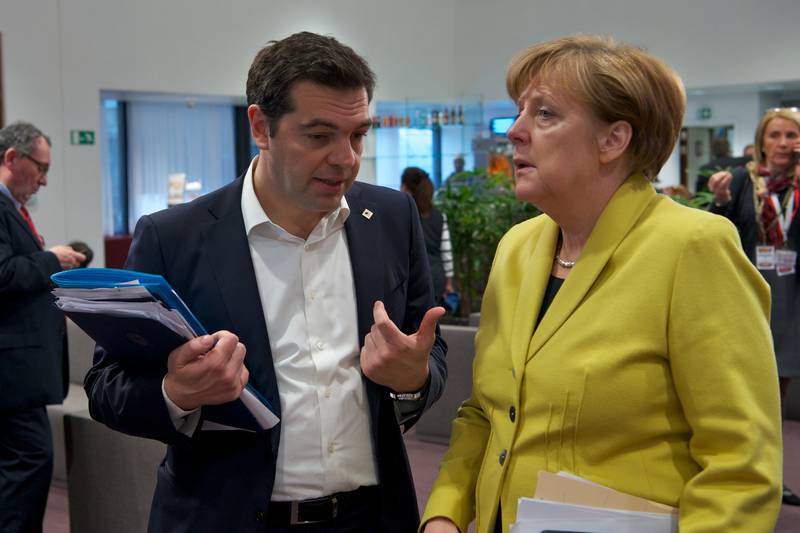 Other countries along the Eastern flank of the EU were unusually silent regarding their contribution to the solving of the crisis in Turkey.
Other countries along the Eastern flank of the EU were unusually silent regarding their contribution to the solving of the crisis in Turkey.
Great Britain, on the other hand, was the third face of the EU. The Kingdom has serious financial contribution towards states like Turkey, which are bearing the heaviest burden, but at the same time, having not left the Union officially yet, it is already acting as a non-member. PM David Cameron announced after the summit that Great Britain would not grant visa-free access to Turkish nationals. According to him, this is a decision just for Schengen states. Besides, Great Britain will not accept more refugees than the 20 000 Cameron promised last year to take directly from camps in countries, neighbouring Syria. The cherry on the cake was his statement that borders are good for Europe. “Frankly, it's right more borders are being put in place. The fact there are now more borders in place in Europe has been one of the things that started to slow down the number of migrants”, said Mr Cameron.
*Most recent data shows an increase both in the Turkish route and the Mediterranean one
Translated by Stanimir Stoev
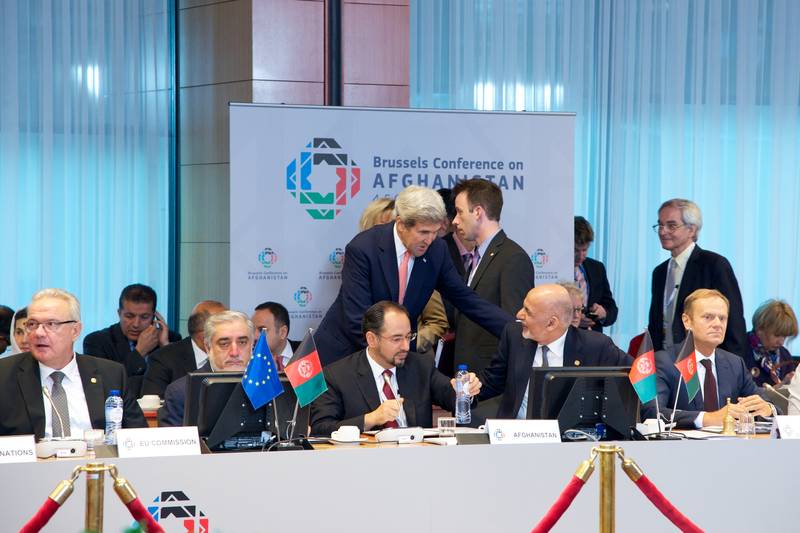 | © Council of the EU
| © Council of the EU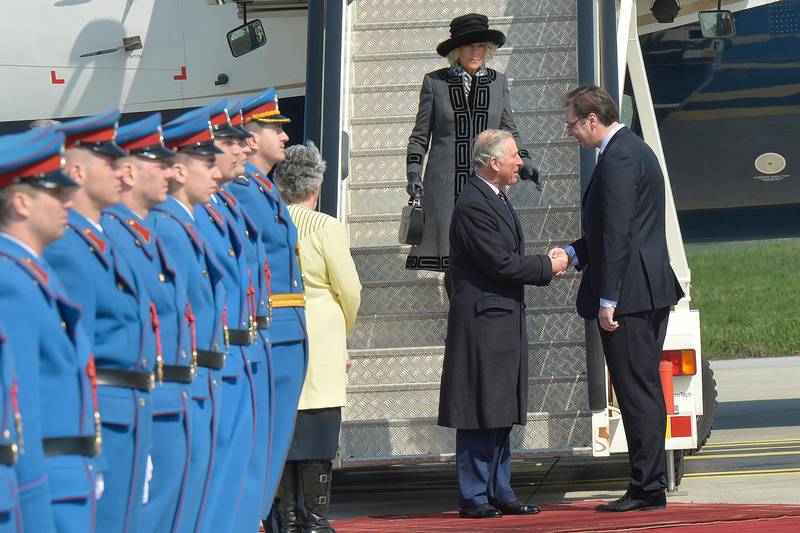 | © Vlada RS
| © Vlada RS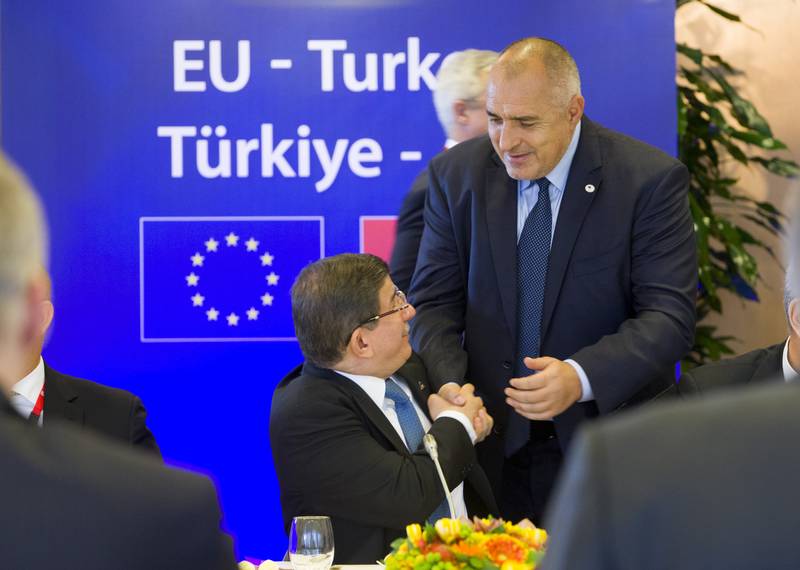 Ahmet Davutoglu, Boyko Borissov | © Council of the EU
Ahmet Davutoglu, Boyko Borissov | © Council of the EU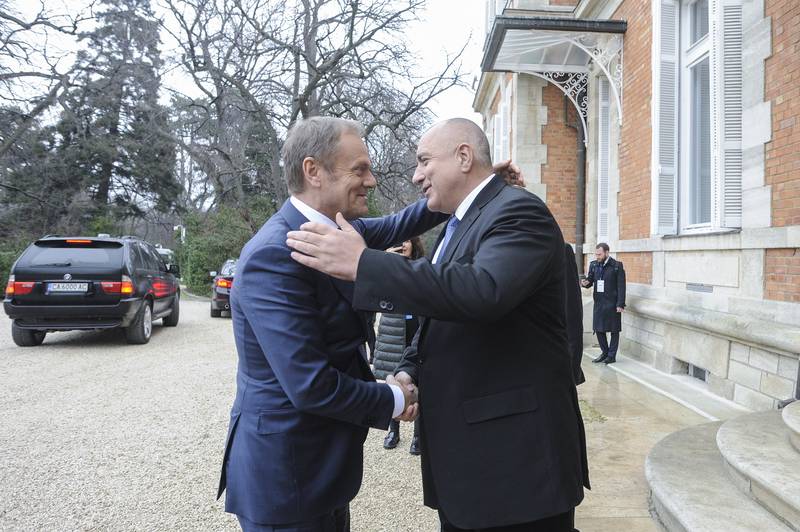 Donald Tusk, Boyko Borissov | © Council of the EU
Donald Tusk, Boyko Borissov | © Council of the EU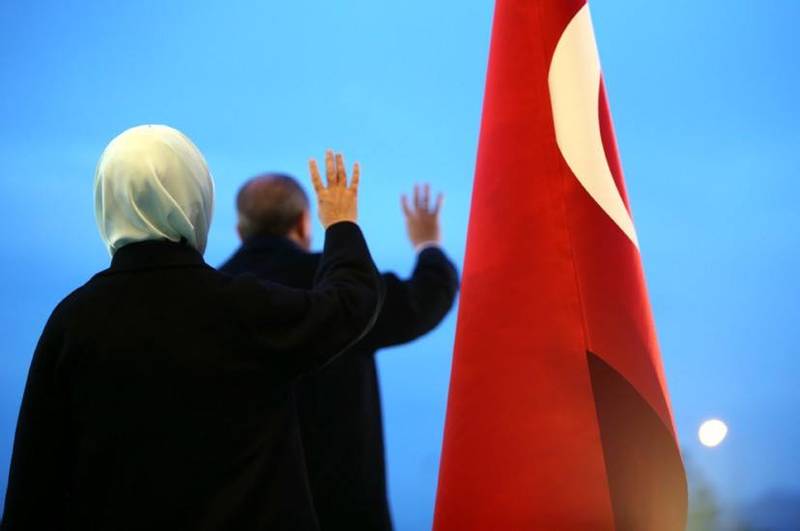 | © Turkey Presidency
| © Turkey Presidency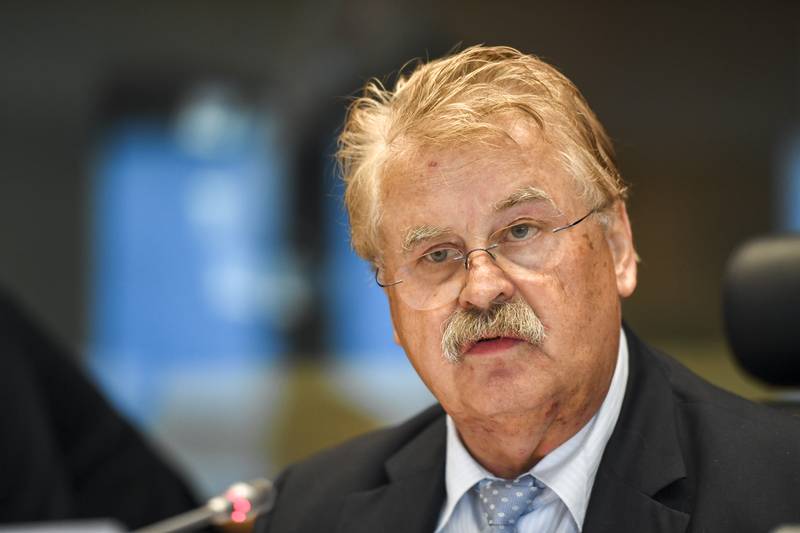 Elmar Brok | © European Parliament
Elmar Brok | © European Parliament